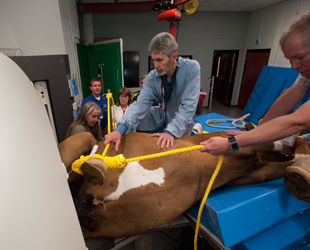Equine Medicine & Surgery
Equine Internal Medicine
We provide specialized diagnostic and therapeutic expertise for the care of medical problems in horses.
Our facilities are specially designed to accommodate the high-risk patient, and appropriate biosecurity protocols are always in place to ensure safety of all of our patients from infectious diseases.
Our capabilities include:
- Endoscopy of the upper airway, gastrointestinal tract, and urinary tract:
Endoscopy is a minimally-invasive diagnostic tool that enables direct visualization of areas of the body such as the upper airway, gastrointestinal tract, and urinary tract. This is a safe, non-surgical approach that may require sedation.
- Neonatal intensive care units
- Radiographic imaging of the abdomen and thorax including myelogram capabilities, ultrasound, and CT scan for head and neck problems
- EMG capabilities for muscle and/or nervous system disease
- Treadmill capabilities for upper airway endoscopic evaluation under exercise
- Cardiology telemetry monitoring equipment
- Neurology stall with sling capabilities for the management of the down, surgery, or atoxic horse
Our facilities include dedicated areas for the care of animals with infectious diseases, so that we can provide them the treatment they need without risking the welfare of other hospital patients.
Why Might My Horse Visit Internal Medicine?
There are many advanced medical problems we can manage and treat, but the following are some of the most common reasons patients visit Internal Medicine:
- Hyperkalemic periodic paralysis (a genetic muscle disease)
- Recurrent exertional rhabdomyolysis (a form of tying up)
- Polysaccharide storage myopathy (abnormal glycogen storage in the muscles, a form of tying up)
- Respiratory issues, including coughing, nasal discharge, or respiratory noise
- Diarrhea
- Lack of appetite
- Urinary tract disease, including infection, abnormal frequency of urination, or abnormal appearance in urine color
- Nuerological problems associated with abnormal behavior, gait change, or paralysis
- Weight loss
- Exercise intolerance
- Chronic or recurrent colic
- Abnormal chewing or swallowing
- Fever
- Choking
- Head shaking
- Metabolic disease (Cushings disease)
- Muscle disease


